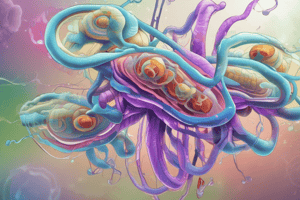Podcast
Questions and Answers
Which of the following organisms is most likely responsible for a 22-year-old male college student's severe vomiting after consuming old fried rice?
Which of the following organisms is most likely responsible for a 22-year-old male college student's severe vomiting after consuming old fried rice?
- Salmonella
- E. coli O157:H7
- Bacillus cereus (correct)
- Clostridium botulinum
Which of the following organisms is most likely responsible for a 30-year-old lady's muscle paralysis and difficulty in breathing after consuming canned fish with rice?
Which of the following organisms is most likely responsible for a 30-year-old lady's muscle paralysis and difficulty in breathing after consuming canned fish with rice?
- Bacillus cereus
- E. coli O157:H7
- Salmonella
- Clostridium botulinum (correct)
Which organism is most likely responsible for an outbreak of food poisoning with severe bloody diarrhea among children after eating dinner at a BBQ farm?
Which organism is most likely responsible for an outbreak of food poisoning with severe bloody diarrhea among children after eating dinner at a BBQ farm?
- Bacillus cereus
- Clostridium botulinum
- Salmonella
- E. coli O157:H7 (correct)
What is the difference between foodborne intoxication and infection?
What is the difference between foodborne intoxication and infection?
Which two foodborne pathogens have caused over 90% of worldwide bacteria-related foodborne illness?
Which two foodborne pathogens have caused over 90% of worldwide bacteria-related foodborne illness?
In a case of Staphylococcal intoxication, how long does it take after exposure before symptoms are evident?
In a case of Staphylococcal intoxication, how long does it take after exposure before symptoms are evident?
In which types of food does Clostridium botulinum grow?
In which types of food does Clostridium botulinum grow?
What temperature is required to destroy the spores of Clostridium botulinum?
What temperature is required to destroy the spores of Clostridium botulinum?
Which type of toxin does Bacillus cereus produce that is heat-stable?
Which type of toxin does Bacillus cereus produce that is heat-stable?
What is the lethal dosage of the toxin produced by Clostridium botulinum?
What is the lethal dosage of the toxin produced by Clostridium botulinum?
Which of the following microorganisms is commonly used in food processing?
Which of the following microorganisms is commonly used in food processing?
What is the main factor influencing the growth of microorganisms in food?
What is the main factor influencing the growth of microorganisms in food?
Which of the following organisms is likely to cause food spoilage in a refrigerator?
Which of the following organisms is likely to cause food spoilage in a refrigerator?
What is the temperature range for psychrophilic microorganisms?
What is the temperature range for psychrophilic microorganisms?
Which factor is crucial for microbial growth, with minimal water activity required being 0.95 for most fresh foods?
Which factor is crucial for microbial growth, with minimal water activity required being 0.95 for most fresh foods?
At what pH level are bacterial pathogens typically unable to grow?
At what pH level are bacterial pathogens typically unable to grow?
Which phase of the microbial growth curve involves reduced nutrients?
Which phase of the microbial growth curve involves reduced nutrients?
What is the temperature danger zone for microbial growth?
What is the temperature danger zone for microbial growth?
Which classification is based on the temperature range in which organisms can grow?
Which classification is based on the temperature range in which organisms can grow?
Which method is used to inhibit microbial growth in the food industry and has specific temperature ranges for effectiveness?
Which method is used to inhibit microbial growth in the food industry and has specific temperature ranges for effectiveness?
What does relative humidity impact in food?
What does relative humidity impact in food?
Which technique is used to control microbial growth in food items and involves the addition of weak acids?
Which technique is used to control microbial growth in food items and involves the addition of weak acids?
What is the range for the temperature danger zone for microbial growth?
What is the range for the temperature danger zone for microbial growth?
Which method is used to inhibit microbial growth and involves the use of weak acids like vinegar?
Which method is used to inhibit microbial growth and involves the use of weak acids like vinegar?
What is the classification based on the amount of moisture in the air that impacts water activity in food?
What is the classification based on the amount of moisture in the air that impacts water activity in food?
Which phase of the microbial growth curve involves favorable growth conditions?
Which phase of the microbial growth curve involves favorable growth conditions?
Which type of bacteria causing foodborne illness forms spores?
Which type of bacteria causing foodborne illness forms spores?
What is the aim of food preservation?
What is the aim of food preservation?
What is the D value in thermal destruction kinetics?
What is the D value in thermal destruction kinetics?
Which method of food preservation involves adding acid, salt, or sugar?
Which method of food preservation involves adding acid, salt, or sugar?
Which bacteria causing foodborne intoxication is associated with heat-stable toxins?
Which bacteria causing foodborne intoxication is associated with heat-stable toxins?
What is the Z value in thermal destruction kinetics?
What is the Z value in thermal destruction kinetics?
Which bacteria causing foodborne infection includes Salmonella?
Which bacteria causing foodborne infection includes Salmonella?
Which virus can cause foodborne illness?
Which virus can cause foodborne illness?
What is the aim of biological methods in food preservation?
What is the aim of biological methods in food preservation?
What does UHT stand for in heat treatment methods for food preservation?
What does UHT stand for in heat treatment methods for food preservation?
What does F value measure in thermal destruction kinetics?
What does F value measure in thermal destruction kinetics?
Flashcards are hidden until you start studying
Study Notes
Foodborne Illness and Food Preservation
- Foodborne illness can be caused by infectious agents (pathogens) such as bacteria, molds, viruses, and parasites, as well as toxins or chemicals.
- There are two main types of foodborne illness: foodborne infection, caused by live pathogenic microorganisms in food, and foodborne intoxication, caused by ingesting toxins formed by microorganisms in the food.
- Pathogenic bacteria causing foodborne infection include Vibrio parahaemolyticus, Vibrio cholerae, Bacillus cereus, and Salmonella, while bacteria causing foodborne intoxication include Staphylococcus aureus, Clostridium botulinum, and Escherichia coli.
- Psychrophilic bacteria include Listeria monocytogenes, while bacteria that can form spores include Bacillus cereus.
- Foodborne illness can also be caused by viruses such as Norovirus and Hepatitis A virus, mold toxins like Ergot and Aflatoxin, and protozoa leading to illnesses like Ciguatera food poisoning.
- Food preservation aims to prevent spoilage, loss of quality, and extend the shelf life of food products while ensuring their safety.
- Principles of food preservation involve the elimination or inactivation of microorganisms, stopping enzyme action, and preventing oxidation.
- Methods of food preservation include physical methods like heating and low temperature, chemical methods such as adding acid, salt, or sugar, and biological methods like fermentation.
- Heat treatment methods for food preservation include pasteurization at 72°C for HTST milk, UHT milk, and sterilization, which completely kills or removes all life forms, including bacteria and other organisms.
- Thermal destruction kinetics measures the efficiency of thermal-killing and involves values like D value, Z value, and F value, which relate to time, temperature, and the death of microorganisms.
- D value is the time required to destroy 90% of microorganisms at a specific temperature, while Z value is the temperature change needed to achieve a 90% reduction in the D-value.
- Understanding foodborne illness and food preservation methods is crucial for ensuring food safety and preventing foodborne illnesses.
Studying That Suits You
Use AI to generate personalized quizzes and flashcards to suit your learning preferences.




